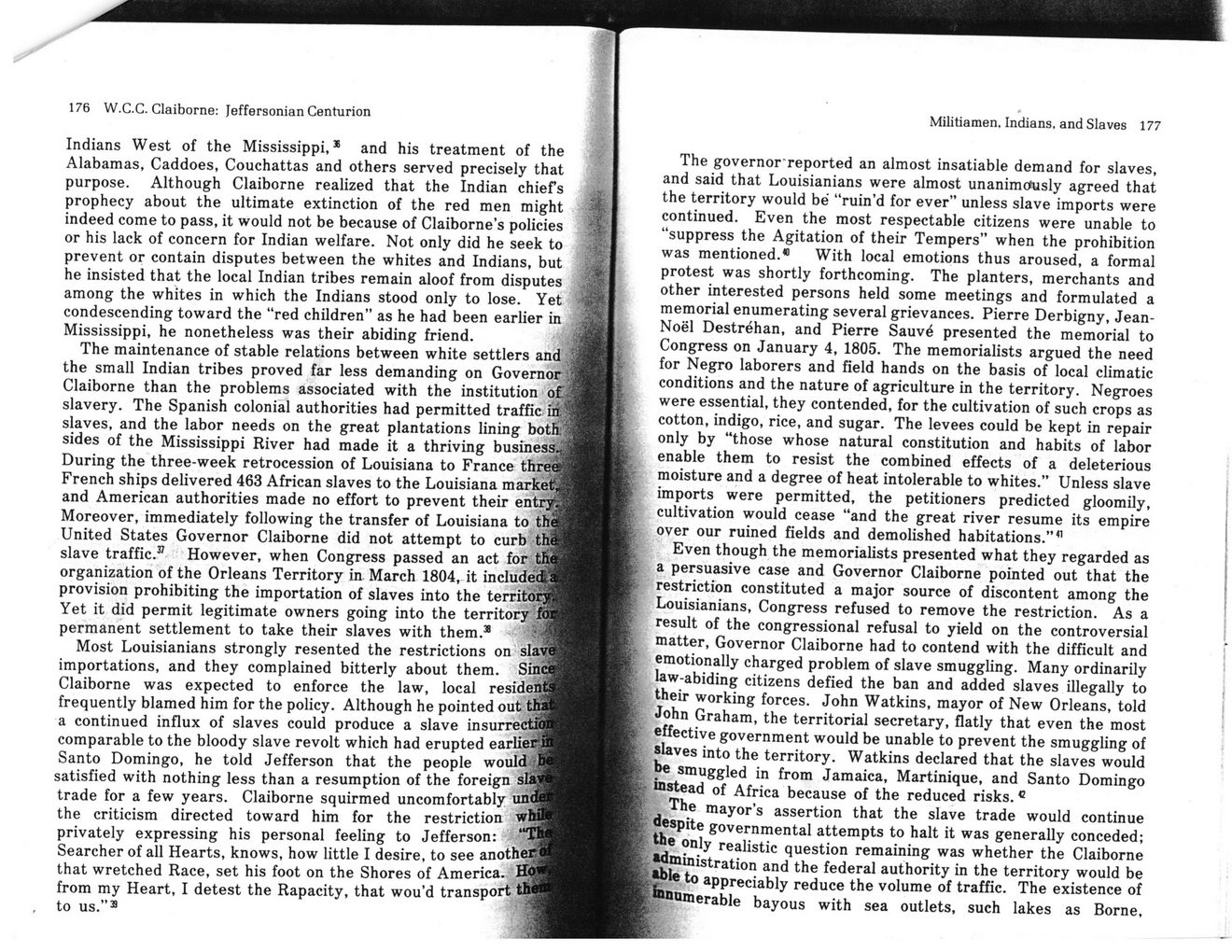This text was obtained via automated optical character recognition.
It has not been edited and may therefore contain several errors.
176 W.C.C. Claiborne: Jeffersonian Centurion Indians West of the Mississippi,36 and his treatment of the Alabamas, Caddoes, Couchattas and others served precisely that purpose. Although Claiborne realized that the Indian chiefs prophecy about the ultimate extinction of the red men might indeed come to pass, it would not be because of Claiborne’s policies or his lack of concern for Indian welfare. Not only did he seek to prevent or contain disputes between the whites and Indians, but he insisted that the local Indian tribes remain aloof from disputes among the whites in which the Indians stood only to lose. Yet condescending toward the “red children” as he had been earlier in Mississippi, he nonetheless was their abiding friend. The maintenance of stable relations between white settlers and the small Indian tribes proved far less demanding on Governor Claiborne than the problems associated with the institution o£ slavery. The Spanish colonial authorities had permitted traffic \M slaves, and the labor needs on the great plantations lining botlii sides of the Mississippi River had made it a thriving business.* During the three-week retrocession of Louisiana to France threa French ships delivered 463 African slaves to the Louisiana markeraj and American authorities made no effort to prevent their entrjra Moreover, immediately following the transfer of Louisiana to then United States Governor Claiborne did not attempt to curb th® slave traffic.37 However, when Congress passed an act for tliS organization of the Orleans Territory in March 1804, it included^! provision prohibiting the importation of slaves into the territorjl Yet it did permit legitimate owners going into the territory fija permanent settlement to take their slaves with them.38 Most Louisianians strongly resented the restrictions on slav« importations, and they complained bitterly about them. Sincffl Claiborne was expected to enforce the law, local resident* frequently blamed him for the policy. Although he pointed out tluM a continued influx of slaves could produce a slave insurrectljM comparable to the bloody slave revolt which had erupted earlier^® Santo Domingo, he told Jefferson that the people wouldi'fflB satisfied with nothing less than a resumption of the foreign slajjH trade for a few years. Claiborne squirmed uncomfortably un<^B the criticism directed toward him for the restriction whiW privately expressing his personal feeling to Jefferson: <fl| Searcher of all Hearts, knows, how little I desire, to see anothefflB that wretched Race, set his foot on the Shores of America. from my Heart, I detest the Rapacity, that wou’d transport tMM to us.”33 Militiamen, Indians, and Slaves 177 The governorreported an almost insatiable demand for slaves, and said that Louisianians were almost unanimously agreed that the territory would be “ruin’d for ever” unless slave imports were continued. Even the most respectable citizens were unable to “suppress the Agitation of their Tempers” when the prohibition was mentioned.® With local emotions thus aroused, a formal protest was shortly forthcoming. The planters, merchants and other interested persons held some meetings and formulated a memorial enumerating several grievances. Pierre Derbigny, Jean-Noel Destrehan, and Pierre Sauv£ presented the memorial to Congress on January 4, 1805. The memorialists argued the need for Negro laborers and field hands on the basis of local climatic conditions and the nature of agriculture in the territory. Negroes were essential, they contended, for the cultivation of such crops as cotton, indigo, rice, and sugar. The levees could be kept in repair only by “those whose natural constitution and habits of labor enable them to resist the combined effects of a deleterious moisture and a degree of heat intolerable to whites.” Unless slave imports were permitted, the petitioners predicted gloomily, cultivation would cease “and the great river resume its empire over our ruined fields and demolished habitations.”41 Even though the memorialists presented what they regarded as a persuasive case and Governor Claiborne pointed out that the restriction constituted a major source of discontent among the Louisianians, Congress refused to remove the restriction. As a result of the congressional refusal to yield on the controversial matter, Governor Claiborne had to contend with the difficult and emotionally charged problem of slave smuggling. Many ordinarily law-abiding citizens defied the ban and added slaves illegally to their working forces. John Watkins, mayor of New Orleans, told John Graham, the territorial secretary, flatly that even the most effective government would be unable to prevent the smuggling of slaves into the territory. Watkins declared that the slaves would be smuggled in from Jamaica, Martinique, and Santo Domingo instead of Africa because of the reduced risks.c The mayor’s assertion that the slave trade would continue espite governmental attempts to halt it was generally conceded; “>e only realistic question remaining was whether the Claiborne ^ministration and the federal authority in the territory would be Hi aPPreciably reduce the volume of traffic. The existence of * nDmerable bayous with sea outlets, such lakes as Borne,

Pirate House Document (039)